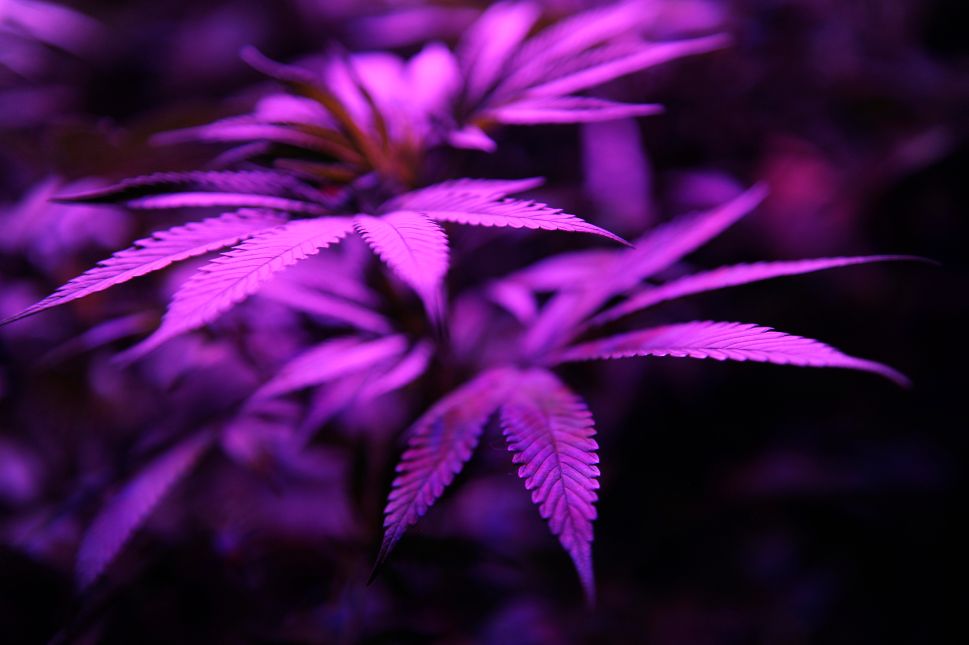Gmo Strain How Do You Know

The ancient fine art of selective convenance is good by almost anybody who grows crops or husbands livestock for a living. Those who don't are both willfully putting themselves at a competitive disadvantage and breaking with an established norm.
And since cannabis sativa, the taxonomic definition for both recreational marijuana likewise as the source textile for CBD, is America's hottest agricultural article, the obvious answer to the obvious question—"is at that place GMO weed?"—is almost certainly yep, and if not at present, then there volition exist very presently. The 2d quandary, then, is to figure out what to practise about it.
Run across Besides: How Can You Tell If Your CBD Product Is Adept (or Even Has CBD)?
Carefully breeding crops or animals in order to reduce or eliminate certain traits and magnify others—in pursuit of a fast racehorse; a particularly cute (or thicc) canis familiaris; a fruit that's very tasty, with loftier yields and skillful resistance to bugs and blight—is something that's been done "for centuries," every bit the Federation of American Scientists observed in its official entry for "genetically modified crops."
One master departure betwixt what, say, the Amish exercise and what's washed in corporate labs—and what freaks certain people out and leads to certain countries, like in Europe, to ban GMO crops, while others, chief among them the United States, to heartily embrace lab-honed foodstuffs—is that you can breed a certain gene in or out "in one generation rather than 20." (Whether the main risk is genetic instability leading to food insecurity or the subsequent dumping of patented pesticides and herbicides on fields of GMO corn or soybeans—the praxis for farmers purchasing, for example, RoundUp Ready products from agribusiness giant Monsanto—can depend on whom you ask.)
Selective breeding is admittedly happening right at present in the marijuana industry. We know this because it has always happened—this is what breeders and seed banks do. And for the past few years, you have been able to search the U.S. Patent and Trademark Office database to observe patent applications for proprietary cannabis strains. This ways there are plant scientists, botanists and garage-level growers akin trying to observe the killer strain, and using whatsoever means necessary to do and so.
All of this touches a very sensitive nervus in the marijuana industry, which has for years been haunted by the specter of GMO weed. It's been enough of a thing that both Snopes and Monsanto felt the need to address—and dismiss as an "internet rumor"—the allegation that its scientists were working on GMO marijuana. (Whether this is an honest denial or an practice in nominalism—perhaps Monsanto is working on something that'southward cannabis sativa, AKA hemp, which would make their statement correct—only visitor insiders know).
In the meantime, marijuana cultivators appear to want to both craft the greatest strain but do it in a way that isn't quite what Big Ag does, even if the just deviation appears to be one of scale. As Marijuana Business concern Daily recently reported, a partnership betwixt an Oregon outdoor cannabis farm and a Portland, Oregon-based clearinghouse of cannabis genetics went sour afterwards the former became upset at the latter—and for a reason that may not be intellectually sound or even consistent.
Eastward Fork Cultivars' stated goal was to grow more than and better CBD-rich varieties of both hemp and marijuana. (The difference is legal, not botanical: cannabis sativa with 0.3 percent or less THC is hemp; anything more is marijuana, nether federal police.)
To exercise this, the farm partnered with Phylos Bioscience, a genomics firm that has, for at least 4 years, been crowdsourcing cannabis genetics to build a database of all the cannabis institute's diverse tones. The growing experiment was well underway until a video of Phylos' CEO Mowgli Holmes speaking highly of partnering with Big Ag to breed plants surfaced. That led Eastward Fork Cultivars to publicly suspension with Phylos.
As MJ Biz Daily recounted: "The uproar underscores the cannabis industry'south unease over Big Ag companies eventually entering the infinite and controlling the ways of production and genetics—a fear bred out of precedents ready past the commercial agriculture market."
But at the same time, cannabis genetics take been available all along for anyone—including Big Ag—to swipe and to improve upon, in a lab if necessary.
"All Monsanto or Dow have to do is go to a dispensary and purchase everything that anybody'southward buying," said Reggie Gaudino, a PhD and longtime cannabis industry genetics researcher who now serves as vice president of research and development at Front Range Biosciences, a Colorado-based company, in an interview with MJ Biz Daily. "They tin sequence it themselves, and they're home free."
The perceived adventure for well-nigh cannabis cultivators is that they'll wake up one day and find out that the strain they've been perfecting or even selling to dispensaries for years is suddenly the intellectual holding of somebody else. Power plays like this are de rigueur in business and are often fought out in the courts, for years—simply are yet an abstraction for most consumers. Equally corn and soybeans and other agricultural bolt demonstrate, consumers don't actually seem to care if their cease production was perfected in a field, in a garage or in a lab—just if it's affordable and skilful and does the trick.
And then is there GMO cannabis right now? Depends on your agreement of the term. Will there be? Virtually certainly yes—the only questions are who will produce it, will it be any proficient and will anyone care enough to stop it? 
Source: https://observer.com/2019/09/gmo-marijuana-effects-identification/
0 Response to "Gmo Strain How Do You Know"
Post a Comment